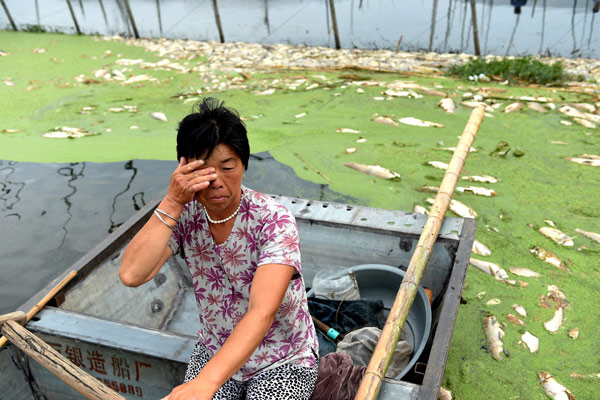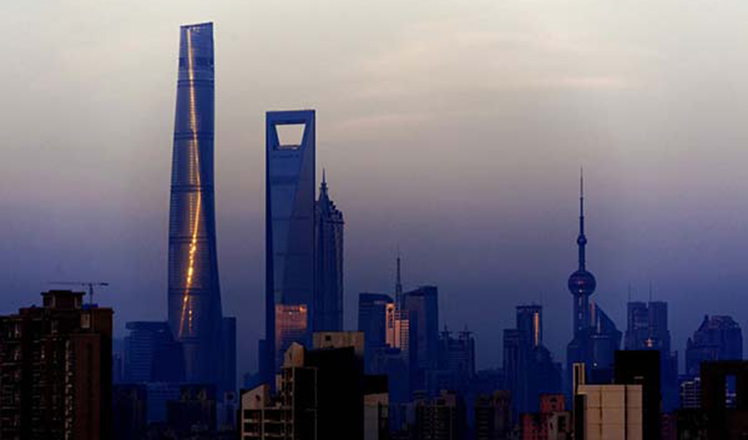China vows to root out soil pollution
Updated: 2016-03-18 08:07
By Zheng Jinran(China Daily)
|
||||||||
 |
|
A fisherman's wife wipes away tears on a boat on Tuohu Lake in Wuhe county, Anhui province, as thousands of fish killed by pollution float on the surface of the water. [Photo/Xinhua] |
Administrative reform
To achieve the aims of the plan, the Ministry of Environmental Protection has reformed its administrative structure by eliminating two departments - pollution prevention and control, and pollutants emission control - and setting up three new offices to target air, water and soil pollution.
The reform will streamline the working process and make the efforts to tackle pollution more efficient, according to Chen, the minister.
Moreover, new, binding targets on pollution control have been listed in the five-year plan for the first time. They stipulate that by 2020 the number of days of good air quality in 338 cities must be more than 80 percent per year, In addition, the concentration of PM2.5 - particulate matter with a diameter of less than 2.5 microns, so small that it can enter the bloodstream - should be reduced by 18 percent in major cities by the same year.
The new regulations have been well-received by experts and the public.
Wu Shunze, deputy head of the Chinese Academy for Environmental Planning - a think tank - said the guideline is a signal that the country has shifted the focus of its environmental protection strategies, which is a major reform.
The binding targets will force governments at all levels to impose tougher regulations, and to improve efficiency in their efforts to reduce pollution, "but it's only a start. To move forward, we will need follow-up plans to set more targets for governments," he said.
Barbara Finamore, Asia director at the Natural Resources Defense Council, an international environmental NGO, said the plan represents an important step forward in China's war on pollution, and the most striking feature is the emphasis on enforcement.
"This (to realize the goals, standards and reforms set out in the plan) will require a strong regulatory approach, as well as building the capacity for enforcement and compliance at both the provincial and local levels," she wrote in an e-mail exchange with China Daily.
Meanwhile, experts said the existing action plans on air and water pollution control and prevention are working as planned.
For example, China is making visible progress in controlling air pollution: last year, PM2.5 readings fell by more than 14 percent in 74 major cities, and the Pearl River Delta region achieved overall compliance with the national standard. The improvement in the air quality has been so pronounced that it has been observed by NASA satellites.
Progress has also been made in the control of water pollution. The Ministry of Housing and Urban-Rural Development has completed a wide-ranging survey of severely polluted rivers in urban regions and has set schedules for greater improvements.
"The current situations regarding air, water and soil pollution are different, yet connected with the sources of pollution," said Yang Fuqiang, a senior analyst at the Natural Resources Defense Council, who stressed that air and water pollution are far more visible than soil pollution, which means it often goes unnoticed as a result.
About 40 percent of the mercury in China's air is the result of burning coal, and the poisonous element can fall to earth and contaminate soil and water, he said, adding that industries that rely on coal, such as mining, chemicals and power plants, can cause pollution during both extraction and processing.
The three types of pollution are interconnected, so governments should make coordinated efforts to tackle all three, and also take joint controls into consideration when formulating policies, he said.
Contact the writer at zhengjinran@chinadaily.com.cn

 These university canteen dishes will blow your mind
These university canteen dishes will blow your mind
 Eslite bookstore story reads like a page-turner
Eslite bookstore story reads like a page-turner
 World's biggest computer and software fair kicks off in Germany
World's biggest computer and software fair kicks off in Germany
 Aerial view of cole flower fields presents unique pastoral charm
Aerial view of cole flower fields presents unique pastoral charm
 Largest blue diamond to appear at auction
Largest blue diamond to appear at auction
 Journalists from around the world at Li's news conference
Journalists from around the world at Li's news conference
 Google's AlphaGo defeats Go grandmaster
Google's AlphaGo defeats Go grandmaster
 Emperor's seal set for auction in Hong Kong
Emperor's seal set for auction in Hong Kong
Most Viewed
Editor's Picks

|

|

|

|

|

|
Today's Top News
Chinese biopharma debuts on Nasdaq
What ends Jeb Bush's White House hopes
Investigation for Nicolas's campaign
Will US-ASEAN meeting be good for region?
Accentuate the positive in Sino-US relations
Dangerous games on peninsula will have no winner
National Art Museum showing 400 puppets in new exhibition
Finest Chinese porcelains expected to fetch over $28 million
US Weekly

|

|







